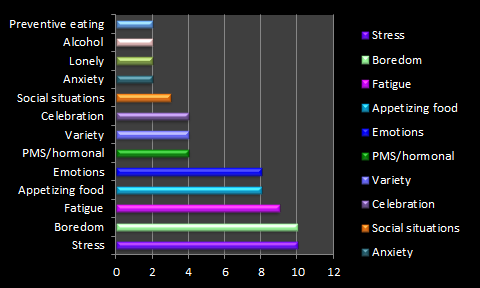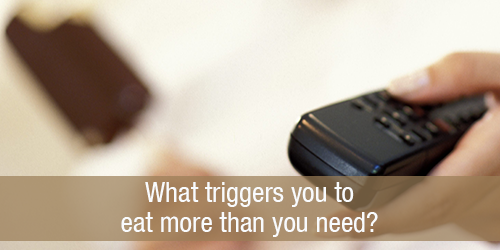I was curious about your most common triggers for overeating, so I asked this question on our Facebook: page:
What are your top three triggers for overeating?
Before we get to the responses, let’s clarify what we mean by the words “triggers” and “overeating.”
I am using “trigger” to mean any situation, person, place, or other association that prompts a desire to eat. Learn more about triggers here.
“Overeating” is eating to the point of discomfort. It doesn’t mean exceeding a predetermined portion size or consuming too much of a so-called “bad” food. Read more: What Does Overeating Mean?
Most Common Triggers for Overeating
Not surprisingly, there was quite a bit of overlap in your triggers for overeating. Stress, boredom, fatigue, appetizing food, and “emotions” came out on top.
We also got a couple of funny responses. My favorite was “Forks, Spoons, and Knives.”
Here’s a quick tally of the most common triggers based on the first 30 responses to our informal poll:

What to do about triggers for overeating?
Awareness is the starting line for change. So the important question is, what do you do about your triggers for eating?
Am I Hungry? Mindful Eating Programs are designed to help you recognize your cues for eating, make conscious decisions about why, when, what, and how much you eat, and when you’re not hungry, how to meet your needs better than eating does.
 Let’s use the common trigger, fatigue, as an example of how this works.
Let’s use the common trigger, fatigue, as an example of how this works.
Let’s say it is evening, an hour or two after dinner, and you feel like eating something. You get up, wander into the kitchen, and just before you open the refrigerator, you pause to check in, and realize you’re not hungry. You’re tired.
With this awareness, you have three choices.
1)You can still eat if you want to. When you choose to eat anyway, you then notice how you feel afterward without judgment. (Maybe more tired? Maybe still wanting more food?)
2) You could choose to redirect you attention from the food, maybe crocheting or playing a game on your phone.
3) You have the option of meeting your true needs, in this case, going to bed and getting some sleep!
When you aren’t quite sure how to meet your needs, try the FEAST strategy I shared in this post.
A Few Common Triggers for Eating
Here are a couple of articles that address the two most common triggers: stress and boredom.
I eat when I’m bored: What to do about boredom eating
We have many articles on this website about emotional eating; use the search function above. Here’s a good one to get you started:
Don’t Stop Emotional Eating! Learn from it instead!
As you become aware of your triggers, explore them one at a time. And if you need help, that’s what we’re here for!
Read more about how our Eat Mindfully, Live Vibrantly Program addresses these challenges using the BEST of our 25 years of experience.



2 thoughts on “What are the Most Common Triggers for Overeating?”
This is exactly what I need . . . stress is a huge trigger but so are hormones . . . and more so when they happen at the same time! Can’t wait for the next post.
Comments are closed.